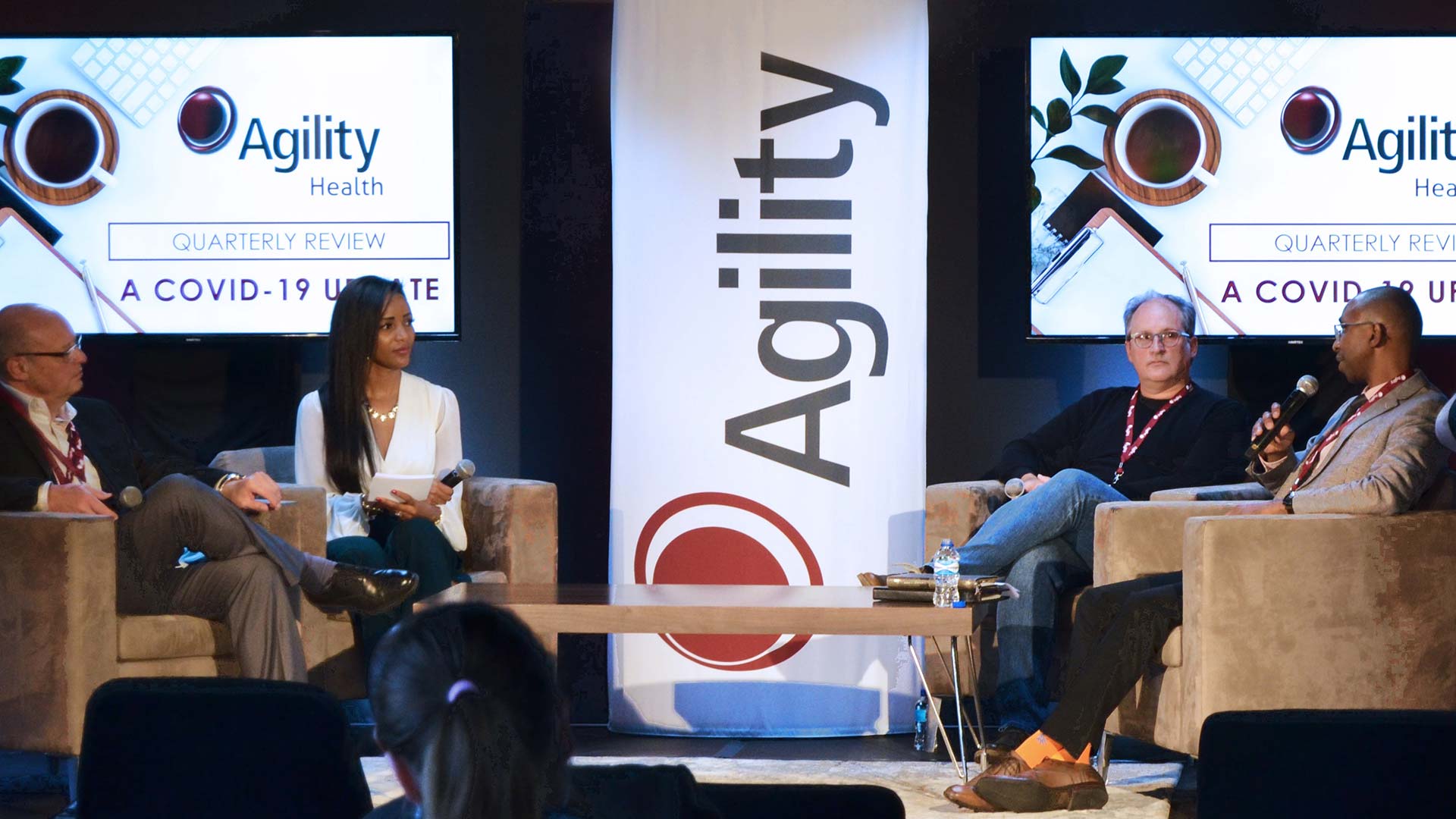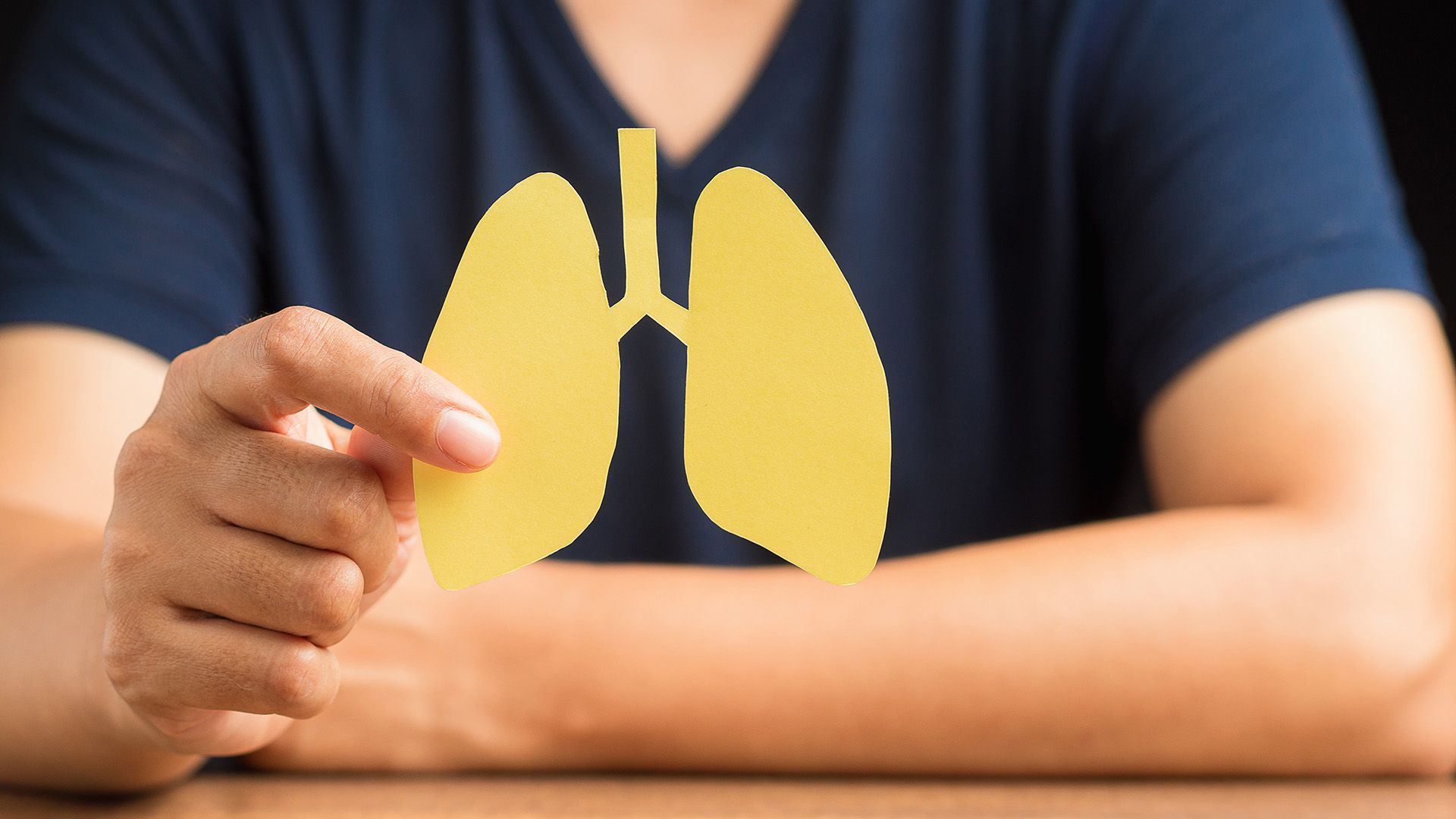Vital decisions can’t be postponed in a pandemic
May 21, 2021
(Left to right) Clinical pharmacology expert Dr Jacques Snyman, MC Nandi Molefe, health and social security systems specialist Prof Alex van den Heever, and virology expert Prof Sim Mayaphi are pictured during a panel discussion hosted by leading managed care provider and medical scheme administrator Agility Health.
Experts weigh in on managing the risks of Covid-19
Aiming for the moving target of Covid-19 herd immunity may be unrealistic, potentially requiring an annual global booster vaccine to fend off emerging variants, according to experts speaking at Agility Health’s most recent Quarterly Healthcare Review.
“Many governments are targeting herd immunity, but it is unachievable in the same way it is unachievable for flu,” said Professor Alex van den Heever, health and social security systems specialist of the University of the Witwatersrand (Wits) School of Governance, during the panel discussion hosted by leading managed care provider and medical scheme administrator Agility Health on Wednesday.
“We are starting [the South African Covid-19 vaccine rollout] in May, and we should have started in January or February… So, it is good that we are rolling out, but it does have consequences that we are rolling out this late.”
Prof Van den Heever was speaking on an expert panel with virology expert Prof Sim Mayaphi and clinical pharmacology expert Dr Jacques Snyman, reflecting on the local and global handling of the Covid-19 pandemic, the vaccine rollout and crucial lessons for the third wave and beyond.
Time is of the essence
Dr Snyman, clinical development expert for Agility Health in Africa and Agility Risk Solutions in Asia, added that while the contexts of vaccine rollout are very different between, for example South Africa and Singapore, there are lessons to be drawn from the Southeast Asian nation despite it being an island that has simpler logistics to manage.
“What we can learn from them is the speed of decision making. For instance when should lockdown be implemented, and the science applied to the decision-making. What is key for me, is that a decision must be made; you cannot postpone a decision during a pandemic,” Dr Snyman said.
Regarding the local delays in securing vaccines, Prof Van den Heever added: “A number of bilateral agreements were not entered into in 2020 on the basis of cost. A number of us did analyses of the costs of the complete vaccination programme. The costs ranged from R7.5 billion to reach what was understood as herd immunity at that point, to about R15 billion.”
He added that this was “well within the capability of South Africa”. “One of the parts we took into account in terms of the fiscal impact was the fact that all healthcare workers are on medical schemes, therefore their [vaccine] costs would not be for the State,” Van den Heever said, adding that the Sisonke Programme also made vaccines available to healthcare workers without diminishing State resources.
Preparation for the next pandemic
“If there is any pandemic that has caught us by surprise, it’s this one,” Prof Mayaphi, head of the Department of Medical Virology at the University of Pretoria and National Health Laboratory Services’ Tshwane academic division, said, adding that better planning is needed to prevent the next pandemic.
“At a global level, there is a lesson in pandemic preparedness. This has shown us that the world is not ready for any pandemic. We need to ask critical questions such as, could we have predicted this and are our healthcare systems geared for pandemics.
“Surveillance programmes are needed to look at the animal-human interface of viruses and the prevalence of viruses in animal hosts to see if we can predict these viruses being transmitted from host animals to humans. We already have many examples of this, including Covid-19,” Prof Mayaphi said.
Dr Snyman adds that virus mutation is likely to mean that Covid-19 will continue to produce new variants of concern. “If we are vaccinated this year, this could mean we don’t necessarily have immunity for the strains that emerge next year.
“Various vaccines are targeting various sites of the virus. That particular antibody will only be effective as long as that part of the virus has not mutated. The Johnson & Johnson and Pfizer vaccines are only partially effective, but they reduce the likelihood and severity of illness. Will these vaccines protect us into the future? We simply don’t know. The next strain may not be affected by the antibodies we have vaccinated for. It is therefore likely that long-term vaccination strategies will be required.”
Going viral
Prof Van der Heever added that global pandemic planning had not factored in the possibility of an airborne infectious disease, and that it took some time before it could be established that Covid-19 could be transmitted this way. “This poses the most extreme risk for a pandemic, it’s the fastest [way] it could be transmitted…. That’s the one that’s going to overrun testing and tracing, it’s going to overrun border controls,” he said.
“[Covid-19] also has the problem that some people may have very high viral loads and transmit the virus without symptoms, as a consequence people are unaware of their status and there’s a high-risk window period where they are infectious. We didn’t initially understand the asymmetric nature of transmission. In other words, it’s not 2.5 people being infected by one person every day, it is one person potentially infecting 50 people in one sitting.”
Strong, sustainable health resources needed
Prof Mayaphi said a vital lesson for the future is the importance of strengthening healthcare systems. “All over the world, even in high income countries, healthcare systems were overwhelmed by Covid-19, although low-income countries have suffered the most… We need to invest in infrastructure to be able to cope better in future such as developing laboratory tests and facilities.”
Prof Van den Heever pointed out that developing local manufacturing capacity for treatments to achieve resilience would require production for a wider market in order to be feasible. “You’ve got to basically set up a commercial arrangement, which is mostly going to be for export, but which government can contribute towards on condition that there is going to be a redirection to the domestic or regional market as a condition for those subsidies… Otherwise, the irony is that a vaccine is going to cost 20 times what it costs to produce by, for instance, the Serum Institute of India. Scale is very important.”
Dr Snyman said that medical scheme data from the first and second waves showed different patterns in hospital admissions and claims. “During the first wave, out of those admitted to hospital almost 80% had co-morbid conditions. Specifically, more than 50% had cardiovascular co-morbidities or diabetes.
“In the second wave, we saw a 10 to 15% absolute reduction in patients with those types of chronic conditions. They still suffered co-morbid conditions, but it was a reduced proportion of diabetes and cardiovascular disease comorbidities compared to other comorbidities,” he said.
“In terms of claim profiles, there was a drive to better compliance with chronic care. Patients started making sure their diabetes and cardiovascular conditions were under control. There was a reduction in elective hospitalisations, and the members were seeking outpatient and primary care rather than inpatient care.”
“Patients started taking ownership of their diseases and medicine compliance increased. The awareness of risk and comorbid conditions seemed to have helped and should be capitalised on as this is the correct behaviour. The one good thing we have seen in the Covid-19 pandemic is the fact that people now take their chronic conditions more seriously and understand the importance of good disease control.”
Looking at private public partnerships and the relevance for the future, Prof van den Heever pointed out that it is a requirement that a country uses its total capacity to care for its people and that Government should embrace and expand their consultative and delivery processes to ensure best outcomes.
Doctor Snyman also pointed out that the pandemic forced better public private partnerships and that private healthcare facilities could also help to extend the reach of the national vaccination programme.
“We have the tools, and we should use the tools,” Dr Snyman said.













